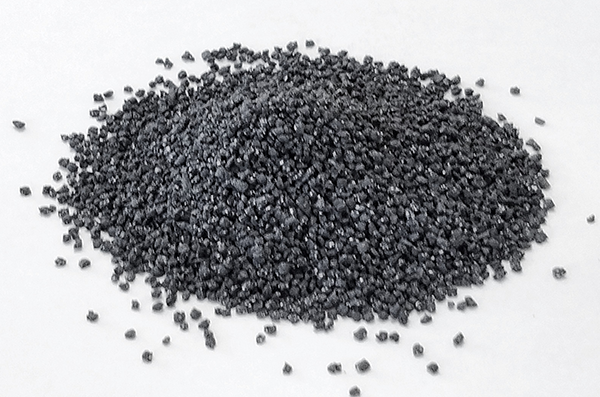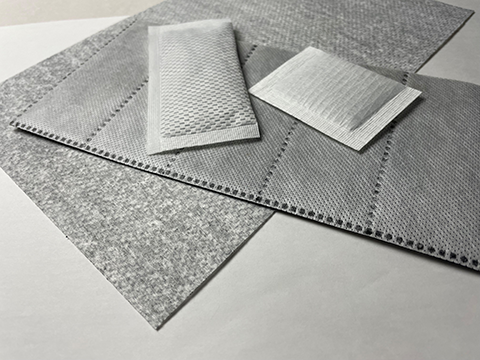SDGs Granular Carbon
Contribute to sustainable and carbon-neutral society
Features of SDGs Granular Carbon
- Effective utilization of biochar emitted from wood biomass power generation.
- Contribute to reducing the emission of carbon dioxide, which is a cause of global warming.
- Enhance performance through various processing techniques and catalytic technologies cultivated in the production of activated carbon.
- Capable of supplying sustainability, low cost, and volume.
- Promote the soundness of forest environment through the use of domestic timber and reduce CO2 emissions during transportation.

SDGs Granular Carbon is a new product that uses biochar, a sustainable material, and differs from traditional pellet carbon. It is granulated to a size of approximately 1.0 to 1.4 mm (14x18 mesh) and is ideal for use as a deodorizer in household goods and miscellaneous items.
SDGs Granular Carbon surpasses activated carbon in terms of ammonia deodorizing performance. Additionally, by producing biochar from nearby power plants in-house, we can keep the price low, contributing to cost reduction.
We aim to promote the widespread use of this product by emphasizing its quality and price as a deodorizer, as well as its carbon-neutral advantages.
Background and Development Objectives of the New Product
The price of activated carbon has been rising due to increased costs and currency fluctuations.
Meanwhile, as demand for carbon-neutral products grows, our company aims to offer an effective and affordable deodorizer by utilizing biochar, a byproduct of wood biomass power generation.
Product Overview
Functional Carbon Using Biochar (For Deodorization and Gas Removal, Excluding Water Applications)
| Product Name | SDGs Granular Carbon |
|---|---|
| Product Number | KR-2 |
| Material | Biochar,Natural Minerals,Natural Binder |
| Particle Size | 1㎜φ,14x18 mesh(1.0~1.4㎜) |
| Bulk Density | 0.74g/cm3 |
| Dry Weight Loss | 10% or less |
| Packaging | Packed in Paper Bags (Net Weight: 20 kg per Bag) |
| Price | Quotation to be Provided Upon Request |
| Features |
|
Gas Removal Performance Comparison
| Comparison Items | SDGs Granular Carbon KR-2 | Coconut Shell Activated Carbon KD-GW |
|---|---|---|
| Ammonia(100ppm) |  |
 |
| Trimethylamine(50ppm) |  |
 |
| Hydrogen Sulfide(20ppm) |  |
 |
| Methyl Mercaptan(10ppm) |  |
 |
<Test Conditions>
Fill a 2-liter polyethylene bag with 5 grams of each sample and a specified concentration of gas. After one hour, measure with a detection tube (internal test).
The initial concentration is marked as "〇". Test ReportPDF
Comparison with Coconut Shell Activated Carbon
| Category | SDGs Granular Carbon KR-2 |
Coconut Shell Activated Carbon KD-GW |
|---|---|---|
| Shape | Granulation(1.0~1.4mm) | Crushing(0.3~0.85mm) |
| Performance | High Gas Adsorption Performance (Ammonia Removal is Superior to Activated Carbon) |
High Gas Adsorption Performance |
| Price | Consistently Low Price | Rising Price Trend |
| Carbon Neutral (CO2 Reduction) |
Utilizes ash (biochar) generated from biomass power plants that use thinned wood as material | Relying mostly on imported products |
| Already carbonized, so no CO2 is emitted | CO2 is emitted during the carbonization process of coconut shells | |
| Used as is as a raw material | Burn a large amount of heavy oil in the heat treatment (carbonization) process | |
| Transported by truck from the power plant to the factory. Since the power plant is within the same prefecture, the transport route is short. | Transporting from overseas factories by local trucks and maritime containers results in significant CO2 emissions until the goods arrive domestically. | |
| Sustainability | Can be continuously and stably supplied | Price is expected to continue rising (due to factors such as exchange rates, transportation costs, raw materials, and environmental costs) |
Future Developments
SDGs Granular Carbon is suitable for use in products such as small packages and deodorizing sheets.
We will explain the advantages of price, quality, and environmental aspects to industrial users currently using conventional coconut shell activated carbon, as well as to stakeholders involved in manufacturing and selling household goods.
We will propose transitioning to this product.
